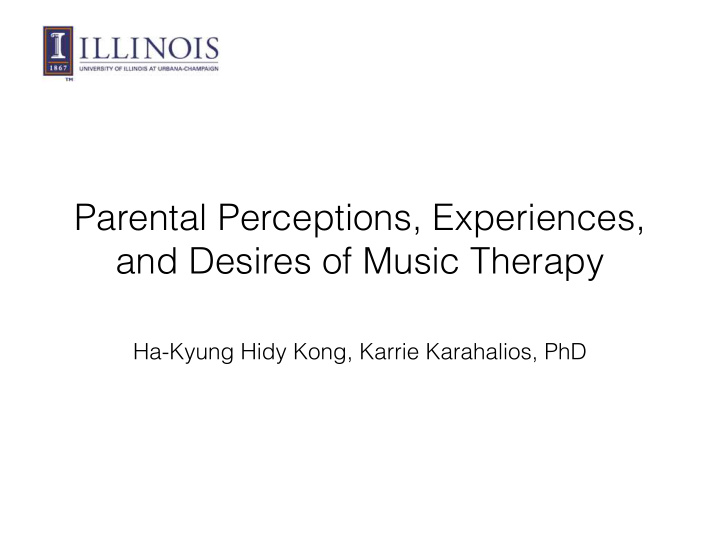



Parental Perceptions, Experiences, and Desires of Music Therapy Ha-Kyung Hidy Kong, Karrie Karahalios, PhD
What is Music Therapy? http://i2.cdn.turner.com/cnnnext/dam/assets/130807163516-music-therapy-illustration-story-body.jpg
http://www.pianotunesacademy.com/images/musictherapy.png “the clinical and evidence-based use of music interventions to accomplish individualized goals within a therapeutic relationship by a credentialed professional who has completed an approved music therapy program” American Music Therapy Association (AMTA)
http://i1.wp.com/macprovid.vo.llnwd.net/o43/hub/media/1123/8850/Figure_3_-_Music_Therapy_in_Hospitals.jpg Four music experiences in Music Therapy Listening Improvisation Re-creating Composition All images from Unsplash
Three origins of music therapy approaches • Psychotherapy (e.g., Bonny Method of Guided Imagery and Music) https://www.youtube.com/watch?v=NIdtMOd8k8A - • Music Education https://www.youtube.com/watch?v=uHUxkleEnqM (e.g., Orff-Based Music Therapy approach) - https://www.youtube.com/watch?v=NIdtMOd8k8A • Medicine (e.g., Neurologic Music Therapy) https://www.youtube.com/watch?v=8Ia9aahOavI https://i.ytimg.com/vi/EK5qqYYxjn4/maxresdefault.jpg
“The Music Child” Nordoff and Robins Photo by Clark Young
Research questions RQ 1: Why do parents choose music therapy for their children? • RQ 2: Why do parents discontinue music therapy ? • RQ 3: What benefits do parents expect from music therapy sessions? • RQ 4: What benefits did parents see through music therapy sessions? • RQ 5: What changes do parents want to see in the field of music • therapy?
Online parental survey on music therapy • 19 closed-ended, 8 open-ended questions • 59 responses U.S. = 21, South Korea = 38 • age of child mean = 12 yrs, s.d. = 6.21 yrs
Table 1. Table of survey results (total = 59).
Table 1. Table of survey results (total = 59).
RQ1: Motivations for starting music therapy • the diagnosis of the child • specific benefits • the child's interest in music
RQ1: Motivations for starting music therapy autism spectrum disorder • the diagnosis of the child speech-related delay/disorder developmental delay • specific benefits Down Syndrome ADHD episodes of seizures • the child's interest in music anxiety disorders Williams Syndrome encephalopathy
RQ1: Motivations for starting music therapy • the diagnosis of the child reduced frequency of seizures • specific benefits improved self-expression stress relief • the child's interest in music
RQ1: Motivations for starting music therapy • the diagnosis of the child • specific benefits “Due to seizures, music was one of two ways she would respond • the child's interest in music to stimuli.” (R15)
RQ3 and 4: Desired and actual benefits Desired benefits Actual benefits 40 30 20 10 0 Cognitive Behavioral Language Physical Social Emotional Musical total = 59
RQ4: Actual benefits of seen through music therapy • emotional changes • behavioral changes • language changes
RQ4: Benefits of music therapy “We received receptive & expressive • emotional emotions, listenin g , and increased • behavioral happiness and a connection via eye contact/smiles” [R12] • language
RQ4: Benefits of music therapy “doesn't throw tantrums as often, • emotional doesn't hit the youn g er siblin g as • behavioral often, does homework, washes more often, [and] started g oin g on school • language field trips” [R33]
RQ4: Benefits of music therapy • emotional “My son can speak in sentences instead of phrases. Better attention. • behavioral Quicker processin g of questions he was asked and shorter time to • language respond.” [R6]
RQ2: Motivations for discontinuing music therapy Out of 13 parents • unavailability of MT (N=4) • a conflict in schedule (N=3) • received maximum benefit (N=2)
RQ5: Desired changes in music therapy • individualized/diverse programs (n=9) • individualized/diverse programs (n=9) • accessibility (n=8) • accessibility (n=8) • awareness (n=6) • awareness (n=6) • lowered cost (n=4) • lowered cost (n=4) • acknowledgement from organizations (n=3) • acknowledgement from organizations (n=3)
RQ5: Desired changes in music therapy “We need providers in central Illinois that is a ff ordable and available . We found no one in the area to help. We travelled to Texas for our initial treatment and then continued at home with very little outside help . I am not a music teacher and this took the fun element out of the therapy for my son.” Respondent 1 Photo by Albert Cornelissen
RQ5: Desired changes in music therapy • individualized/diverse programs (n=9) • accessibility (n=8) • awareness (n=6) • lowered cost (n=4) • acknowledgement from organizations (n=3)
RQ5: Desired changes in music therapy “It would be nice if schools would reco g nize music therapy as an educational tool for children with disabilities. As it stands, school districts do not want to allow it in schools or to be used within a school environment.” Respondent 10 Photo by Annie Spratt
Assistive technology for music therapy • Teletherapy • remotely conducting therapy • remotely coaching parents • Information organization http://infanthearing.org/ti-guide/img/ti_benefits.jpg http://www.infinitymusictherapy.com/services-for-parents http://res.cloudinary.com/www-virgin-com/virgin-com-prod/sites/virgin.com/files/Articles/Getty/family_music_getty-1.jpg
Assistive technology for music therapy • Teletherapy • remotely conducting therapy • remotely coaching parents • Information organization raising awareness and receiving acknowledgement
THANK YOU Hidy Kong (hkong6@illinois.edu)
Recommend
More recommend